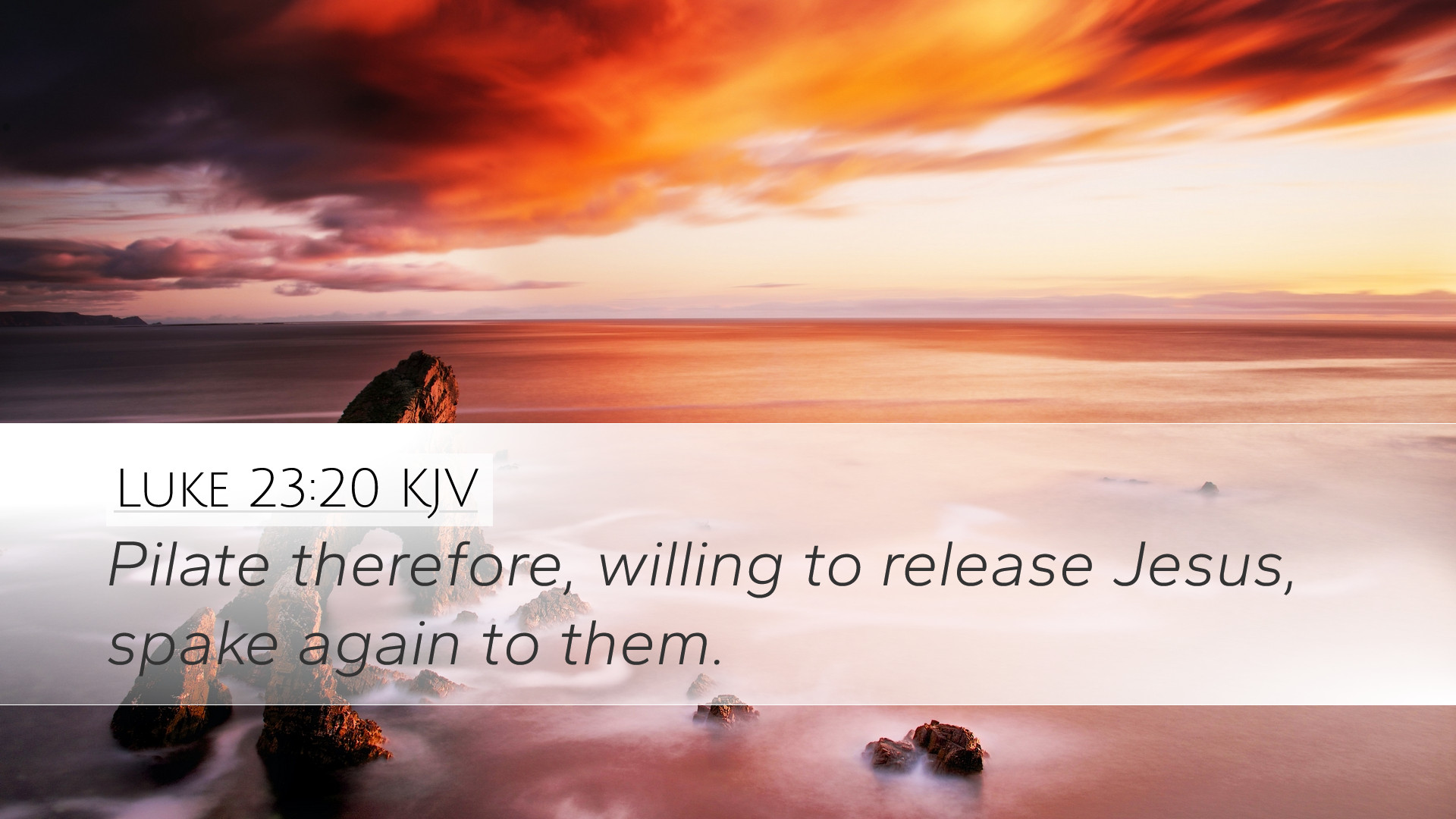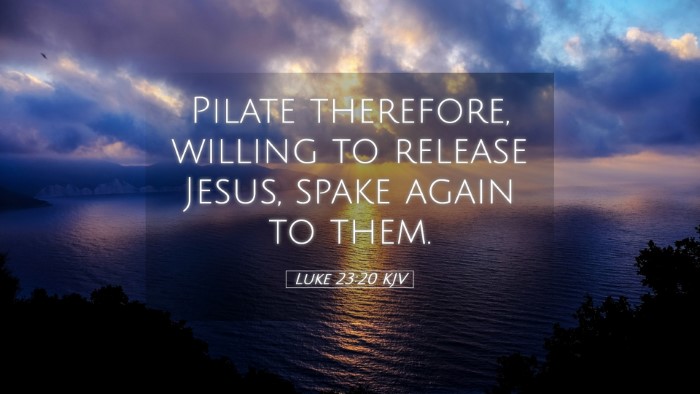Commentary on Luke 23:20
In Luke 23:20, we find a pivotal moment during the trial of Jesus before Pontius Pilate. The verse states:
"Pilate therefore, willing to release Jesus, spake again to them." This brief yet profound statement illustrates
the internal conflict faced by Pilate amidst the crowd's insistent demands for Jesus' crucifixion.
Contextual Overview
The context of this verse is essential in understanding its significance. Prior to this moment, Pilate had examined
Jesus and found no guilt worthy of death, a point echoed in several commentaries. Both Matthew Henry
and Albert Barnes emphasize Pilate’s reluctance to condemn an innocent man.
Political Pressures
Pilate’s desire to release Jesus is noted, but it is crucial to consider the political pressures he faced.
Adam Clarke points out that Pilate was navigating a tense political landscape, aware that
the Jewish leaders were eager to maintain peace in Jerusalem, particularly during the Passover festival.
-
Public Sentiment: Pilate was influenced by the vehement cries of the crowd. His inclination
to release Jesus conflicted with the loud demands for Barabbas, creating a tension between his legal duty
and public opinion.
-
Fear of Rebellion: Pilate's concern about potential riots and unrest among the Jewish population
is emphasized by Barnes, reflecting the delicate balance he sought to achieve during a volatile time.
Theological Insights
This moment also carries deep theological significance. The trial of Jesus is a critical part of the larger narrative
of redemption. It reflects the fulfillment of Old Testament prophecies concerning the Messiah. The actions of Pilate
and the reactions of the crowd exemplify humanity’s role in the crucifixion of Christ, as explored by many Bible
scholars.
-
Fulfillment of Prophecy: The narrative fulfills Isaiah 53:7, where it was prophesied that the
Messiah would be led like a lamb to slaughter, appearing silent before His accusers. This aligns with Pilate’s
observations of Jesus' behavior during the trial.
-
Human Responsibility: The culpability of humanity in the crucifixion is underscored, an idea explored
in-depth by both Henry and Clarke. Pilate's attempts at justice contrast sharply
with the crowd's vehement desire for blood.
Reflection on Pilate's Character
Pilate is a tragic figure in this narrative. His internal conflict reflects a struggle that many face between
moral conviction and societal pressures. Henry explores Pilate's indecision, indicating that he was
swayed more by the fear of man than the pursuit of justice.
Lessons from Pilate’s Decision
-
The Cost of Compromise: Pilate's unwillingness to stand for what he knew to be right illustrates
the cost of compromise in the face of public opinion. His moral failing has echoed through history as a stark warning.
-
The Importance of Boldness: This moment challenges believers today to embrace boldness in
standing for truth, even when it contravenes popular sentiment.
The Role of the Crowd
The crowd’s role in this passage is vital. Their insistence on Barabbas’ release and their cries for Jesus’
crucifixion embody a profound rejection of the truth. Barnes highlights the dangerous dynamics of group
psychology as it leads to a collective decision against justice.
-
Mob Mentality: Crowds can often be swayed not by reason but by emotion, creating an environment
where truth is easily obscured.
-
The Urgency of Response: The challenge to the faithful is to discern when to speak and when to
remain silent, understanding that the crowd may not always reflect the truth.
Application for Today's Believers
As modern readers reflect on Luke 23:20, several applications emerge:
-
Stand for Justice: Believers are called to be advocates for justice and truth, following the
example set by Jesus, even when it is unpopular or leads to personal cost.
-
Awareness of Influences: Just as Pilate was influenced by external pressures, today’s believers
should be vigilant against the influences that can lead them away from God’s truth.
-
The Call to Evangelize: Ultimately, this narrative serves as a call for evangelism, reminding
believers of the urgency of sharing the Gospel amidst a world that mirrors the crowds who chose Barabbas over Jesus.
-
Reflection on Personal Choices: Like Pilate, individuals today must reflect on their choices:
are they swayed by public opinion or do they align their decisions with God’s Word?
-
Desire for Redemption: The desire for Jesus to be released reflects humanity’s need for redemption,
which is found solely in Him.
Conclusion
Luke 23:20 serves as a profound reminder of the moral complexities faced in the pursuit of truth and justice.
Through the characters of Pilate and the crowd, the narrative asks modern readers to examine where they stand
when their convictions are challenged.
This commentary, merging insights from Matthew Henry, Albert Barnes, and
Adam Clarke, hopes to equip pastors, theologians, and students with a deeper understanding
and application of this scripture in today’s context.


